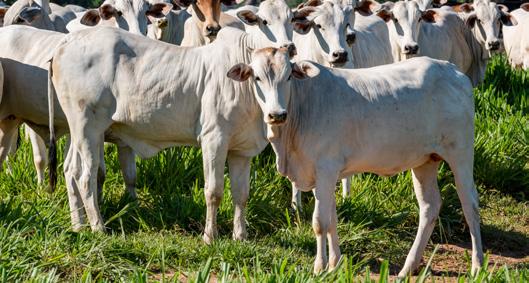WHAT’S THE BEEF WITH JBS?
We live in a boom time for the meat industry.
of that report JBS and three of Brazil’s other big
Worldwide meat consumption is predicted to rise 76%
meat processors signed a voluntary commitment –
by 2050, with meat-heavy diets being energetically
the so-called ‘G4 Agreement’ – to end the purchase
promoted, including in emerging economies and
of cattle whose production is linked to Amazon
by fast food companies. Driven by its insatiable
deforestation, slave labour or the illegal occupation
hunger for new markets and for land on which to rear
of Indigenous lands and protected areas. The
livestock and grow soya for animal feed, the industrial
agreement included a commitment to ensure fully
meat sector poses a threat to the global climate, to
transparent monitoring, verification and reporting of
the wildlife of some of the world’s most biodiverse
the companies’ entire supply chains (including third-
regions, to the human rights of Indigenous peoples
party suppliers) within two years.52
41
42
and other communities and to the long-term health of populations in the West and elsewhere.
Global meat giant JBS exemplifies and is a main
deforestation and human rights violations.53 But
JBS claims to be the world’s largest animal protein
despite its failure to implement the terms of its 2009
company and the second-largest food company in
commitment, as the company plans to seek listing of
the world by annual sales (after Nestlé). It has grown
its international operations on the New York Stock
internationally through a series of acquisitions largely
Exchange (NYSE) in 202154 it appears to be attempting
funded by the state-owned Brazilian National Bank for
to bolster its environmental image and distance itself
Economic and Social Development (BNDES), which
from its destructive legacy. In response to increasing
owns more than a fifth of the company.
pressure from its customers and shareholders,55 in late
46
47
48
JBS’s impacts on the climate and on the
September 2020 JBS launched its new ‘Together for
ecosystems of South America are profound: its
the Amazon’ initiative. As well as setting up a fund to
operations have been estimated to produce around half
support sustainable development and conservation
the annual carbon emissions of fossil fuel giants such as
projects in the region, the company has given itself until
ExxonMobil, Shell or BP, 49 largely as a result of forest
2025 to implement a system for monitoring the supply
clearance linked to its cattle supply chains and the
of livestock to the ranches that directly supply it in the
production of soya for animal feed.
Amazon.56 This new supply chain commitment – which
50
MAKING MINCEMEAT OF THE PANTANAL
others have repeatedly exposed JBS’s links to corruption,
contributor to this threat. Based in São Paulo, 44 45
6
This pledge has not been honoured. For over a decade, investigations by Greenpeace and numerous
43
The scale of JBS’s environmental and social destruction became a global scandal in 2009, when
in real terms represents a step backward from the 2009 commitments – has numerous failings, chief among them:
Greenpeace published a report, Slaughtering the Amazon,51 exposing how JBS and other major players
•
Failure to explicitly extend the whole of the
in the Brazilian beef industry were linked to hundreds
supply chain policy, including ‘zero tolerance for
of ranches in the Amazon, including some associated
deforestation’, beyond the Amazon
with illegal deforestation and other destructive practices, as well as modern-day slavery. In the wake
•
Failure to explicitly exclude as suppliers ranchers that use fire deliberately












